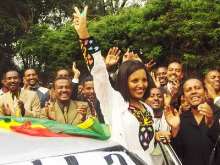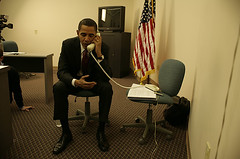 Image via Wikipedia
Image via WikipediaMu minsi ishize natanze amatangazo anyuranye mu cyongereza, igifaransa, n’ikinyarwanda.
Muri ayo matangazo icyo nsaba Abanyarwanda bemerewe gutora, nkabimenyesha abanyamakuru n’amahanga, ni uko batakwitabira ariya matora ya Perezida wa Republika ateganijwe ku itariki ya 9 Kanama 2010. Iki cyifuzo ni ingezi kandi ntabwo ari icyanjye gusa. Kiramutse gishyizwe mu bikorwa cyagira akamaro kanini mu rwego rwo kurwanya politike “mpotozi” ya Perezida Kagame, tukamwereka ko tutamukeneye kugira ngo ayobore Urwanda. Kutajya gutora, nibwo buryo bwonyine bwakwerekana imbaraga z’Abenegihugu mu kurwanya uyu mukakandida wa FPR.
Muri iki gihe ubu buryo bwo kutajya gutora nibwo bwonyine bwakoreshwa tukereka amahanga ko dushoboye kurwanya ingoma y’igitugu itwima ijambo n’ubwisanzure mu gihugu cyacu, dukoresheje inzira y’ubwitonzi buzira urugomo, umuvundo, gusenya no kwica. Bityo tukerekana ko dushaka gukomeza inzira ya demokarasi, ko tudashaka gutotezwa, gucundwa ayikoba, gufungirwa ubusa, kwicwa urubozo no guhotorewa ku marembo dutashye mu ngo zacu.
Ikindi gikomeye cyane twakagombye kwerekana, ni uko tudashaka kuyoborwa n’Umuperezida ufite ibisare n’ibimenyetso simusiga ko ari umwicanyi kabuhariwe, kandi akarenga akiyamamaza, kugira ngo atorwe ku ngufu, maze namara gutorwa akomeze umugambi wo guheeza abatavuga rumwe nawe, ndetse no kubica, mbese nk’uko abikora muri iki gihe. Ibi ntabwo ari ugusebanya, na Perezida Pawulo Kagame ubwe arabizi, uretse ko abyirengagiza: azi neza ko afite imiziro myinshi imubuza guhagarara imbere y’Abanyarwanda ngo arambure ibiganza, agira ati: “Dore ibiganza byera, bitari ibya rukarabankaba”. Arabizi ko atatinyuka kubikora, kandi impamvu arayizi kuturusha:
- Ni umwicanyi: yishe aba Perezida babiri, Perezida w’u Rwanda Yuvenali Habyarimana, uw’u Burundi Sipiriyano Ntarayamira, kandi yarabyiyemereye mu kiganiro cyitwa HARD TALK yagiranye n’umunyamakuru wa BBC, Stephen Sackur, taliki ya 7 Ukuboza 2006, avuga ati: “Askyi, naramaze niba naramwishe, twari mu ntambara, nawe iyo antanga yari kunyica”.
- Ni umwicanyi, kandi atajijishije nawe arabizi, ko ariwe wicishije abanyapolitke b’Abanyarwanda bari abagabo twari dutezeho byinshi mu buyobozi bw’igihugu cyacu: Felesiyani Gatabazi, Emmanweli Gapyisi, Sethi Sendashonga. Aba bagabo b’abanyabwenge yabakurikije, mu rupfu, abandi bagabo bari mu butegetsi bwa FPR ari bo: Colonel Agustini Cyiza, Dr. Leonard Hitimana, na Assieli Kabera. Abanyarwanda bandi yicishije, nawe azi neza ko ari we wabikoze, sinabarondora bose, dore ko harimo n’abasirikare ba FPR batagira umubare.
- Ni umwicanyi, ntabihakana kuko adahwema kwivuga imyato, mbese nk’igihe yari mu Nteko ishinga amategeko akagira ati: “Icyo mvuze iteka ngishyira mu bikorwa. Navuze ko nzacyura impunzi zari muri Congo . Narabikoze ndazicyura, ababyanze: NARABARASHE NDABICA”. Perezida Kagame, uwo twakwita Rwivugabigwi, yarongeye mu Nteko ishinga amategeko ati: “Nibiba ngombwa, isazi nzayicisha inyundo”! Ntitwibagirwe kandi ko ari muri meeting i Bwisige muri Werurwe 2003, yavuze ati: “Nzabaskya, nk’uskya ibigori”. Birumvikana ko iyo avuga ko “azaskya”, aba ashaka kuvuga kwica.
- Kugira ngo Perezida Paul Kagame yerekane ko ashobora guskya abantu, nibwo yishe Colonel Cyiza na Depute Dr. Leonard Hitimana twavuze harauguru. Na none kugira ngo yerekane ko ashobora kwica isazi ziduhira, Perezida Kagame yatumye “escadron” ye y’abicanyi muri Afrika y’Epfo kujya kwica General Faustin Kayumba Nyamwasa: baramurashe, Uwiteka akinga akaboko, ntiyapfa. Ariko hari abandi batagize bene aya mahirwe, nk’umunyamakuru, Yohani Leonard Rugambage, na Visi Perezida w’ishyaka “Democratic Green party”, Andreya Kagwa Rwesereka: “inyundo” yaza “death squads”yarabahitanye. Kubera ko “Inshuti za Kagame” zamaganye cyane ukwicwa kw’ aba Banyarwanda uko ari batatu, barimo General Kayumba Nyamwasa warusimbutse, byateye Perezida Kagame isoni, we na Ministri we w’Ububanyi n’amahanga, Luwiza Mushikiwabo, bigira nyoninyinshi ari nako bagerageza no gutera imbabazi bavuga ko iby’ubwo bwicanyi batabizi. Nyamara ni aya ubusa, icyaha kirabahama.
Turetse kandi iby’ubwicanyi bwa Perezida Kagame, ubu ushakishwa n’Ubushinjacyaha mpuzamahanga, agakizwa ni uko afite ubudahangarwa nka Perezida w’u Rwanda, hari izindi mpamvu zatuma tutamutora: ntidushobora kwirengagiza ko yateje umwiryane mu b’Abanyamulenge, akanabateranya n’abandi Banyekongo, akanateza intambara mu gihugu cyabo cya Congo, akica yo abantu benshi, akavana yo iminyago ifite agaciro kanini cyane, ubu yagize umutungo we bwite.
Ntabwo twamutora kw’itariki ya 9 Kanama 2010, kubera ko:
a) Nta mahoro atanga ku giti cy’umuntu. Ubutegetsi bwe bw’igitugu ntibuduha umutatekano ku mutima no mu mutwe, duhora duhangayitse, tutabona neza ejo hazaza.
b) Ntiyashoboye gukemura burundu ikibazo cyo guhunga igihugu cyatubyaye, ubu impunzi z’Abanyarwanda zikaba zandagaye ku isi hose, akirengagiza nkana ko iki kibazo cyo kuba impunzi aricyo cyabaye nyirabayazana y’intambara yo mu Ukwakira 1990, na jenoside yo kuva muri Mata 1994 kugeza muri Nyakanga 1994. Ahubwo aho kudukiza ubuhunzi arabwongera. None se twamutora tumuca iki?
c) Ntashobora kurangiza ikibazo cy’inkomoko y’ubushyamirane hagati y’Abana b’u Rwanda, ahubwo akomeje kugikaza agiha indi ntera, yitwaje ko yahagaritse wenyine “jenoside y’Abatutsi” asigaye yaragize intwaro ye ya kirimbuzi.
Amajyambere Perezida Kagame yitwaza ntacyo yatumarira igihe cyose tutishyira ngo twizane m’Urwatubyaye. Amajyambere yazana, ayo ariyo yose, ntacyo yatumarira igihe tuzaba tukiri kungoyi ya politiki mbi y’ubutegetsi bw’igitugu. Amajyambere y’umwicanyi arutwa n’amahoro twagira turi abakene ariko turi mu gihugu cyacu. Amajyambere atatugeza kuri “liberte”, (“freedom”), “demokarasi”, no kubaho mu mutuzo, tugenda twemye iwacu i Rwanda, iherezo ry’ayo majyambere ni ugusenyuka, uko byagenda kose.
Twese Abanyarwanda, ibitambo twatanze ku buryo bunyuranye, no kuri za “alitari” zinyuranye (izo mu gihugu, no mu mashyamba ya Congo), ntabwo twabivunja mo amashanyarazi, za mudasobwa, na gaz methane, n’amazu muri Kigali. Ibitambo twatanze nta kiguzi twabibonera, ariko kandi ntabwo byaba byaratanzwe kugira ngo duhere hanze, tuvanwe mu gihugu cyacu na politike mbi; ntabwo byaba byaratanzwe ngo tubure ubumwe, no kwishyira tukizana mu gihugu cyacu. Ibitambo ntitwabitanze kugira ngo Kagame ashyireho ubutegetsi bw’igitugu, bufite ubukana n’ubugome kurusha ubwo twarwanyaga. Turashaka ubutegetsi bubereye ibihe tugezemo, byo kumvikana no kwishyira tukizana iwacu i Rwanda.
Ntagutinya umwicanyi, umwicanyi aramaganwa, tugashyira hamwe tukamurwanya tutamutora.
Bikorewe i Bruxelles, tariki ya 30 Nyakanga 2010
Faustin Twagiramungu
Uwahoze ari Ministri w’Intebe mu Rwanda
Umukandida Perezida muri 2003
Tel: 0032 473 210 512 begin_of_the_skype_highlighting 0032 473 210 512 end_of_the_skype_highlighting begin_of_the_skype_highlighting 0032 473 210 512 
























